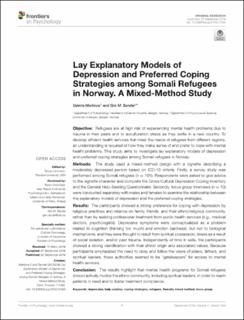| dc.description.abstract | Objective: Refugees are at high risk of experiencing mental health problems due to trauma in their pasts and to acculturation stress as they settle in a new country. To develop efficient health services that meet the needs of refugees from different regions, an understanding is required of how they make sense of and prefer to cope with mental health problems. This study aims to investigate lay explanatory models of depression and preferred coping strategies among Somali refugees in Norway.
Methods: The study used a mixed-method design with a vignette describing a moderately depressed person based on ICD-10 criteria. Firstly, a survey study was performed among Somali refugees (n = 101). Respondents were asked to give advice to the vignette character and complete the Cross-Cultural Depression Coping Inventory and the General Help-Seeking Questionnaire. Secondly, focus group interviews (n = 10) were conducted separately with males and females to examine the relationship between the explanatory models of depression and the preferred coping strategies.
Results: The participants showed a strong preference for coping with depression by religious practices and reliance on family, friends, and their ethnic/religious community, rather than by seeking professional treatment from public health services (e.g., medical doctors, psychologists). Depressive symptoms were conceptualized as a problem related to cognition (thinking too much) and emotion (sadness), but not to biological mechanisms, and they were thought to result from spiritual possession, stress as a result of social isolation, and/or past trauma. Independently of time in exile, the participants showed a strong identification with their ethnic origin and associated values. Because participants emphasized the need to obey and follow the views of elders, fathers, and spiritual leaders, these authorities seemed to be “gatekeepers” for access to mental health services.
Conclusion: The results highlight that mental health programs for Somali refugees should actively involve the ethnic community, including spiritual leaders, in order to reach patients in need and to foster treatment compliance. | en_US |

